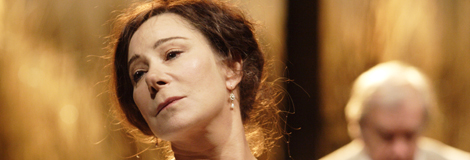The Cherry Orchard at The National
Chekhov’s The Cherry Orchard is a canny piece of writing. Now over 100 years old, the political, philosophical and familial discussions that suffuse the play are very much of that period – a time of intense social change in Russia, as established aristocratic tradition crumbled and an uncertain future presented itself – and yet, thanks to Chekhov’s ability to write as a disinterested party, its themes are still startlingly relevant.
Director Howard Davies clearly didn’t want to take any chances in bringing these relatable themes to the fore when he chose to use Andrew Upton’s version of the play. Upton liberally litters the script with modern idioms and casual asides that are mostly true to the spirit, if not the letter of the original. But it’s a bold move to make because the only two reactions to it will be casual acceptance or utter abhorrence; it does grate at times, especially when an (hopefully) unintentional pop culture reference sneaks in, but it also supports and emphasises the contemporary direction that Davies is going for.
This centres around the two most interesting aspects of the play – the ideological contest between eternal student Trofimov (Mark Bonnar) and self-made man Lopakhin (Conleth Hill), and the emotional make-up of Ranyevskaya (Zoë Wanamaker), the woman suffering the break-up of her fortune, her family and her beloved cherry orchard.
Wanamaker is superb as Ranyevskaya, a character who is made satisfyingly difficult to sympathise with. She is feckless, irrational, spoilt, privileged and takes a decent amount of the blame for the ills in her life. However, Wanamaker artfully brings out the emotional depths and strengths of the character, giving plausible and understandable justifications to her attachment to the cherry orchard, and to her foolish belief in love.
This isn’t a play for a flawless character though, instead the strengths, weaknesses and hypocrisies of each balance the others out. This is best demonstrated in the contrast between Trofimov and Lopakhin, the socialist ideologue and the self-made capitalist. The interesting thing is that they both believe in the same thing – that the land belongs to the serfs who worked it. But for Trofimov this is an abstract, obvious truth that the world will come to accept when his philosophy is realised. For Lopakhin, it is a reality – his grandfather was a serf and he is now a self-made millionaire, in a position to take control of the land.
It is easy to scoff at some of Trofimov’s communist beliefs, and to titter at Lopakhin’s capitalist dreams of leisure and money bringing happiness, in light of what’s happened to both systems in the past 100 years, but the core of their dialect still feels important and timeless.
Nor are they simply ciphers; thanks in no small part to the acting strengths of Bonnar and Hill, both become rounded individuals, good at thinking, rubbish at love, and so they mix in with the rich tapestry of characters that make up the play. Even some of the more throwaway minor characters have occasionally important things to say, or imply, or jokes to make, the beauty being that for every minute of the close to three hours, something is being presented for interpretation.
And as the dilapidated house is boarded up and closed, the overwhelming sense is that everything changes, and nothing does.
The Cherry Orchard runs until July 28 at:
National Theatre
South Bank
Waterloo
SE1 9PX
Box office: 0207 452 3000
Image by Catherine Ashmore







fair trade